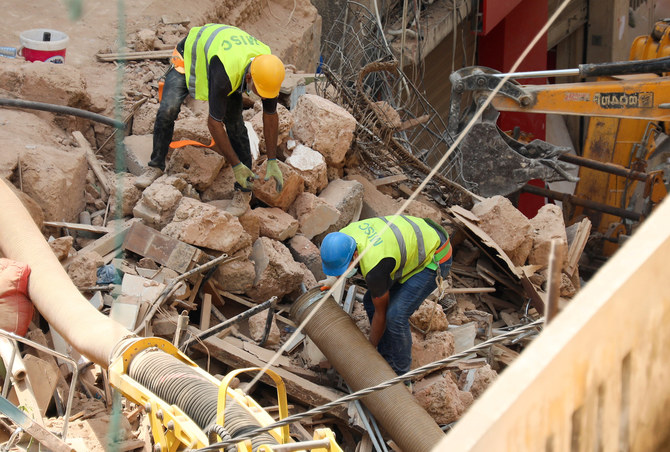BEIRUT: Hopes faded on Saturday that survivors would be found under the rubble of the Mar Mikhael Street building in Beirut.
Rescue teams, including the Lebanese Civil Defense team and the Chilean TOPOS team, continued searching for the third day in a row amid the ruins of the building destroyed by the Beirut port explosion on Aug. 4.
George Abu Musa, director of operations in the Lebanese Civil Defense, said: “Searches are continuing, but the possibility (of survivors) is very small.”
“All the data indicate that nothing positive has resulted so far from the excavation of the largely cracked and collapsed building under which the Chilean sensors detected the breathing of a human being,” Abu Musa said.
“The large cracks in the building prevented us from working with heavy equipment, but we cannot stop working,” he said. “We stopped working for one hour for fear of the building collapsing, and we did not abandon the person under the rubble, as was said. We are at risk and we are under psychological pressure.”
President of the Lebanese Syndicate of contractors for public works and construction, Maroun Helou, told Arab News that the excavation was “being carried out with great care. All results so far indicate speculation, and nothing is certain, according to the information I receive from the excavation site.”
IN PICTURES: Take a look at efforts for possible survivors of the Beirut blast
The hope of finding survivors was expressed on social media under the hashtag “Pulse under the Rubble.”
Meanwhile, Lebanese hopes for the ability of civil society to fight corruption were revived after the World Bank stopped funding construction of the Bisri Dam in the El-Kharroub region in Mount Lebanon. This follows a national campaign “to preserve Bisri Valley as a nature reserve instead of converting it into a geologically failed dam whose goal is to achieve illegal money.”
Reuters reported that “the World Bank canceled $244 million in undisbursed funds for the Bisri Dam project in Lebanon.”
The World Bank had given the Lebanese government until Sept. 4 to resume the dam works, and sit-ins by civil society and the people of the region prevented the works from being completed.
In addition to the Bisri Dam project, the French initiative, which constitutes a road map for the next government, includes a clause stopping the construction of the Silata power plant.
Ministers of the Free Patriotic Movement have insisted on building the plant despite financial losses resulting from a failure to reform the electricity sector. The value of the state’s losses in every one hour of electricity production is $273,000.
The Lebanese people are still waiting on the new government that Prime Minister-designate Mustapha Adib is trying to form. They are also waiting to see the effectiveness of pressure exerted by French President Emmanuel Macron to implement reforms. When he was designated by President Michel Aoun last Monday, Adib said that “a government of experts” would be formed.
There are already political differences over ministerial portfolios, including Hezbollah’s insistence on being represented in the next government, the insistence of Parliament Speaker Nabih Berri on keeping the Ministry of Finance, and the head of the Free Patriotic Movement, Gebran Bassil, asking for a rotation of the main portfolios.
However, the managing editor of An-Nahar newspaper, Ghassan Hajjar, told Arab News: “The French initiative will produce a government in a short period, and it is true that the form of government is a controversial matter, but there will be no politicians or partisans in it but rather personalities far from the parties, and these parties may agree to them.”
Hajjar added: “The issue of distributing ministerial portfolios is also controversial, but I don’t think there are any obstacles. The portfolios may remain distributed among the sects as they were, but with names acceptable to all, and I do not think that French President Emmanuel Macron is gullible enough to propose an initiative without guaranteeing that it will be implemented.”
Hajjar said: “Hezbollah is the only party capable of disrupting the government, and the rest are unable to do so because they are under the international microscope, and in my opinion Hezbollah does not want to obstruct (the formation of the government) unless there is no French-Iranian coordination regarding the initiative. According to the information, many contacts preceded Macron’s visit to Lebanon in order for the initiative to succeed.”
“Hezbollah will be represented in the government by a person close to it but (this person) will not be from the party, lest it be said that it is the government of Hezbollah,” Hajjar said. “I think that this government will not last more than the beginning of next year, awaiting the results of the American elections, but the United States will not block the French initiative because the collapse of Lebanon is not in the interest of the United States. The French initiative secures Lebanon’s security, economic and political stability, and this is what is required by the Americans as well.”















